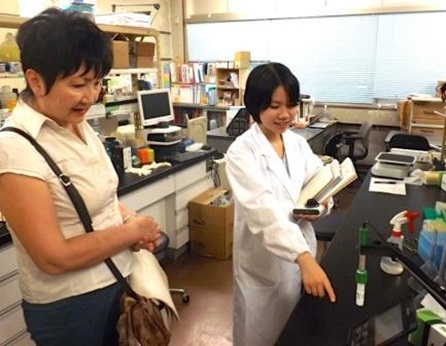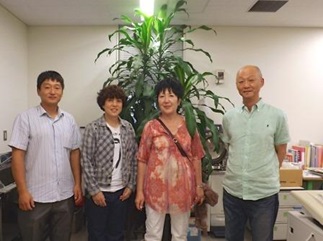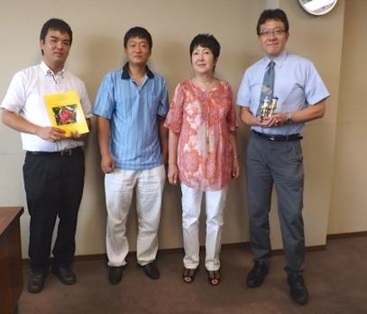Visit to Japan, 2015
Visit to Japan Universities under ISTC support for discussion collaboration with Japanese leading scientists of pharmacology on herbal medicines of Kyrgyzstan’s flora
Japanese scientists recognized worldwide in research and development related to study of flavones properties of skullcap. Our interest of Biotechnology Institute which is a part of the National Academy of Sciences of Kyrgyz Republic, interesting in area of studies such as development bank of genetic resources for microorganisms, plants and animals and in our laboratory is to preserve plant biodiversity and study of their properties. In fact, that we have a very rich flora and a high degree of endemism, can found many medicinal plants. Kyrgyzstan possesses an important and unique biological diversity. The country is rich by rare, endemic and medicinal plants, which have not been fully examined for potential biomedical uses. Moreover, future cooperation study among leading researchers of plant based medicine from Japan and Kyrgyzstan can help to have deeply study medicinal plants and obtained results will be useful not only for both country, but also for all world community who work with medicinal plants.
Take into consideration of worldwide interest to this type of drugs, as well as the uniqueness of our developments, we have been share of our knowledge and would like to continue research with Japanese researchers to bring them to their logical conclusion. Primary procedures and methods optimized - seed collection, handling material in the laboratory, introducing into culture, obtaining isolated and transformed roots, determination of the spectrum of flavones, selection lines and strains, accumulation of root biomass. High value we give for collecting of new species of skullcap and obtaining of new cultures. We have about 40 species of skullcaps, half of them endemic. Analysis of flavones spectrum from native plants showed promising results for many species. Currently, in our seed bank stored seeds of 14 species of skullcap. We regularly make collection increasing. Almost all species can introduced into in vitro culture, but to obtain roots in culture possible not for all species. We recently successfully introduced into culture and obtained root cultures of another endemic. The results are very interesting and promising. All this issue has been discussed at technical meetings with Japanese leading researchers representing three Universities and at Plant based Medicines Museum of Tsumura & CO from August 31 to September 4, 2015.
Now we have come close to the task, appropriate logic strategies for further research - conducting pre-clinical trials of our compounds. This task is very difficult and makes responsibility for us, and we will not be able to move toward without help and participation of Japanese experts with having a large practical experience.
The first meeting was in Nara Women's University (http://www.nara-wu.ac.jp/index-e.html) with Prof. Satoru Matsuda. Prof. Matsuda expressed the view that the objectives of the project are of great practical significance and proposed to strengthen the fundamental problem in the direction associated with genetic passportization of the herbal objects. Studies conducted in their laboratory significantly fit into the research on the ISTC project.


The second meeting held in Kobe Gakuin University (http://www.kobegakuin.ac.jp/english/faculty/pharmaceutical.html) with Dr. Eibai Lee (Professor) and Dr. Riyo Enomoto. The meeting was attended by the coordinator of the University Mr. Kobata. This meeting was particularly rich in the exchange of information and understanding of the project objectives. Doctor Eibai Lee was very impressed with a list of Scutelaria species that will be used in studies and can be valuable sources of flavonoids.



The third meeting was held in Yamanashi University (http://www2.yamanashi.ac.jp/faculties-graduate-school/faculty-of-medicine/) with Dr. Takashi Ohtsuki and the meeting was attended by Coordinator of the University Katsuya Okuwaki. Dr. Takashi Ohtsuki pre-acquainted with our work. The attendees agreed that it is thoughtful questions its possible participation in joint research.


A visit to the Plant based Medicines Museum of Tsumura & CO. (http://www.tsumura.co.jp/english/) was a unique opportunity for the Kyrgyz researchers to see with their own eyes the use of plant resources for human health. The researchers were so impressed that they would never forget this experience with deep thanks to the warm welcome by the staff of museum and the research passion of the company represented by Dr. Osami Takeda.

We thank to ISTC for finance funding and all the involved organizations, universities and persons, who made opportunity of productive meetings and friendly atmosphere in Japan. We are very grateful to Dr. Takeshi Matsunaga (ISTC) for his invaluable assistance in the preparation and conduction of the business trip.